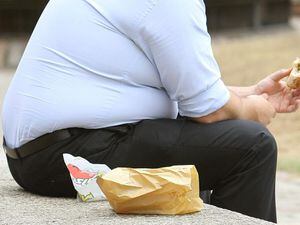Overweight and obese people ‘more likely to gain weight when feeling depressed’
While researchers they can not draw any firm conclusions to the cause, coping mechanisms such as emotional eating could be a factor.

Overweight or obese people are more likely to gain weight when feeling depressed compared to slimmer individuals, according to a study.
Monitoring depressive symptoms in those with a body mass index (BMI) over 25 could be beneficial for their mental and physical health, researchers said.
Academics from the University of Cambridge’s Medical Research Council (MRC) Epidemiology Unit examined data from 2,133 adults enrolled on the Fenland Covid-19 Study.
Patients scored symptoms of depression, anxiety and perceived stress on a mobile app, as well as logging weight measurements, over a period of six to nine months between August 2020 and April 2021.
Each time the score for depressive symptoms increased, the person’s weight one month later was up by 45g, researchers found.
Those defined as overweight, with a BMI of between 25 and 29.9, recorded an average increase of 52g for every point increase, while those classed as obese, with a BMI of more than 30, recorded weight gain of 71g.
Researchers found no evidence of the effect among people with a healthy BMI below 25.
First author Dr Julia Mueller said the findings, published in Plos One, suggest overweight or obese people are more vulnerable to gaining weight when depressed and should be monitored to avoid this.
“Although the weight gain was relatively small, even small weight changes occurring over short periods of time can lead to larger weight changes in the long term, particularly among those with overweight and obesity,” Dr Mueller added.
“People with a high BMI are already at greater risk from other health conditions, so this could potentially lead to a further deterioration in their health.
“Monitoring and addressing depressive symptoms in individuals with overweight or obesity could help prevent further weight gain and be beneficial to both their mental and physical health.”
Senior author Dr Kirsten Rennie said using apps in this way “could help us understand how changes in mental health influence behaviour” among those overweight or obese “and offer ways to develop timely interventions when needed”.
The study found no evidence of changes in stress or anxiety leading to weight gain.
There was also no evidence that weight led to subsequent symptoms of depression.
Dr Mueller said the team “can’t draw any firm conclusions about what caused” the findings, given it was an observational study.
She added: “Our findings suggest that people may react to negative emotions in different ways.
“Some coping mechanisms for dealing with negative emotions might lead to weight gain, like eating more energy-dense foods, known as ’emotional eating’, whereas other coping mechanisms, like talking to a friend, would not lead to weight gain.
“The literature highlights that some people have a tendency to ’emotional eating’ whereas others do not.
“Why people differ in their eating behaviour is currently not quite clear, but it’s likely a combination of factors like genes, the environment, and early life experiences.”
The research was supported by the MRC.





